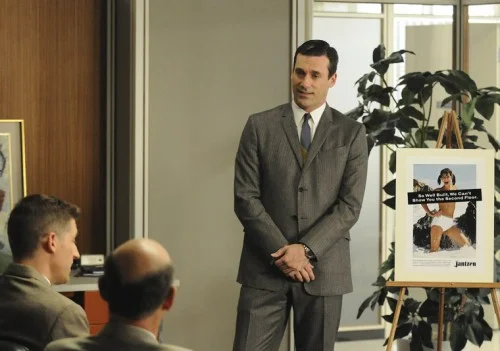It’s treat time, readers! Here’s Ruffle’s new contributor, Kate, with the first of her weekly rundowns on this season of Mad Men. If you’re not hooked by the end of this article, we’ll give you a full refund.
I DIG MAD MEN for lots of reasons. Jon Hamm and Christina Hendricks are two unbelievably gorgeous people. The set, costume and hair designers are obviously having a ball recreating the most stylish parts of the white, middle-class 1960s.
The continuing adventures of Pete and Peggy crack me up. Mostly, though, I watch Mad Men because I am a subtext junkie. Mad Men is not only entirely fueled by subtext, it is a show about subtext itself. How do we navigate the gulf between the carefully constructed surface of an ad campaign (or a person’s life, or a TV show) and the mass of secrets, passions and truths underneath?
Season 4 begins by putting that theme front and center. “Who is Don Draper?” You’d think that somebody as skilled as Don in the art of selling would have no trouble with this open invitation to deliver a pitch for himself—and by association, the fledgling Sterling Cooper Draper Pryce—but the question itself puts Don’s hackles up, and he blows the opportunity. I can’t blame him. The last time somebody forced a meaningful answer to that question out of him, his world fell apart. (Even his new hired help gives him way more sass than Carla ever would have dared.) But his non-answers reveal an important truth to the frustrated Advertising Age reporter, the very truth that Don had tried and failed to keep hidden—there is no Don Draper. And while that might make for interesting television, it doesn’t reflect well on a small advertising firm that needs to trade heavily on their ability to provide unique, personalized treatment to their clients. Don protests that his work should continue to speak for itself, but Bert Cooper makes it clear how things have changed; Sterling Cooper Draper Pryce is in the business of selling Don Draper, and Don gets exactly no say in that decision. (That uncomfortable scene with the prostitute? One might call that a case of the subtext rapidly becoming text.)
Meanwhile, the rest of the Drapers are still reeling from the havoc of last year. Newlyweds Henry and Betty Francis agreed that they would vacate the Draper house over a month ago, but Betty is dragging her feet finding a new place, and the fraying edges of their marriage are already starting to show. The Francis family has no interest in welcoming the Drapers into their Rockwellian Thanksgiving. Sally, as always, seems perched on the edge of a psychotic break. When Don snits to Henry, “Believe me, everybody thinks this is temporary,” I’m inclined to agree with him. The situation is untenable for all involved, although there’s obviously no way that Don is just going to reenter his old life, swapping himself in for Henry Francis as easily as he was swapped out. And, as distasteful as I often find Don’s self-justification, I don’t blame him for his anger at Betty right now. Like Jantzen, the company selling “two-piece bathing suits” (don’t call it a bikini!), Betty wants to reap the benefits of something slightly illicit without relinquishing a “family” image. When Don storms back into the meeting he just stormed out of and bellows, “Get your things and get out of my office NOW,” it’s clear who he’d rather be yelling at. Jantzen and Betty are hiding behind false fronts of moral superiority that undermine Don on his own turf, and, for once, it rattles him. While the idea of being a scrappy, young upstart may be romantic to someone like Pete Campbell, Don’s already been there and done that, and being the underdog now just feels tedious to him. His fuse is shorter than we’ve ever seen it.
The B-plot this week provided some needed comic relief, featuring Peggy’s plan to pay two slightly unbalanced actresses to fight over a ham in a grocery store in order to raise a client’s profile at Thanksgiving. Peggy is my favorite character on Mad Men. If Don is a cipher, Peggy’s a magpie, picking up the choicest bits of the other characters after they’ve left the scene and making herself a patchwork persona. She’s learned from Joan how to use sexuality in the workplace to her benefit (note her cute, new haircut), observed from Don when to woo and when to scorn, and borrowed from Pete a bit of his callous-yet-lovable sociopathy. (And now, from dear Harry, the value of sunscreen.) The result is a unique sort of audacious, ruthless creativity that, in this case, simultaneously succeeded and backfired. Peggy got called on the carpet by Don for the zillionth time for her reckless gamble, but, as she points out, they sold more hams. Peggy’s great because she believes that being willing to own her failures means that she will also be allowed to own her successes. I hope she’s right, but Peggy would do well to remember that all it takes to go two steps back is for somebody to decide they don’t need a girl at the next meeting.
Until next time, my fellow Rufflians, I invite you to share your thoughts and favorite quotes in the comments section. There’s lots I didn’t touch on, so comment away!
Photo credits: amctv.com

Leave a Reply